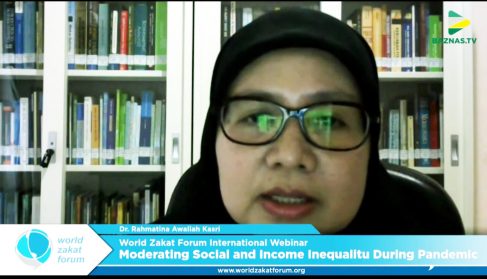Rahmatina Awaliah Kasri at World Zakat Forum’s International Webinar
Nino Eka Putra ~ FEB UI Public Relations Officer
DEPOK, 6 July 2020 – The World Zakat Forum in collaboration with BAZNAS (National Alms Agency) held a Web-Series Talk, with the topic “Moderating Social and Income Inequality during Pandemic”. One of the speakers was Rahmatina Awaliah Kasri, Ph.D., Head of the Center for Islamic Economics and Business (PEBS), FEB UI, a zakat expert who has often collaborated with and engaged in BAZNAS and WZF activities.
The World Zakat Forum (WZF) was initiated in 2007 by nine Islamic countries (Indonesia, Malaysia, Qatar, Kuwait, Turkey, England, Bahrain, Jordan, Sudan, and Saudi Arabia) in response to the need for a world zakat movement. Officially established on 30 September 2010 during the World Zakat International Conference in Yogyakarta, currently WZF has 33 member countries as well as institutional members, such as the UNDP, UNICEF, IsDB, D-8 and Bank Indonesia.
The Covid-19 pandemic has a broad impact on all aspects of people’s lives across the world, including on the health, social and economic sectors. The pandemic has caused a decline in economic performance and growth and triggered widespread poverty and unemployment in Indonesia. Therefore, it is also expected to widen income inequality in society. As a vaccine has yet to be found, there is a possibility that the pandemic will continue and its effects will worsen.

“Therefore, Islamic economy in general and zakat in particular are highly expected to play a role in this current situation. This is because zakat is indeed an Islamic institution that is primarily aimed at helping the poor to ensure prosperity and social justice for all. Theoretically, zakat has the potential to increase aggregate consumption, national saving and investment (domestic) and stimulate aggregate demand and economic growth. Zakat also plays an important role in redistributing income, reducing poverty, and stabilizing the economy,” said Rahmatina Awaliah Kasri at the World Zakat Forum’s international webinar moderated by Astika Rahmah Ghanny, SE, of the Secretariat of World Zakat Forum, on Monday (6/7 / 2020).
Rahmatina went on to say that during the pandemic, zakat is expected to help people affected by the crisis, especially the poor. To that end, BAZNAS and various zakat institutions in Indonesia have carried out various programs to prevent the spread of the virus (such as cleaning up public facilities and worship), among other things, and the Cash for Work program for people who have lost their jobs due to the pandemic. In the short term, people clearly benefit from the programs.
Among the challenges of optimizing the role of zakat during the pandemic is a lack of zakat funds because there are zakat payers who are so poor they become zakat recipients, low zakat literacy rate, and a lack of coordination/collaboration with other institutions that also want to support effortts to deal with the pandemic.
“Better cooperation between the public or government, private or corporate sectors, and the philanthropic sector, including Islamic philanthropy, is needed so that the negative effects of Covid-19 can be moderated and the national economic recovery can run smoothly,” said Rahmatina by way of ending her presentation. (hjtp)
(lem)




